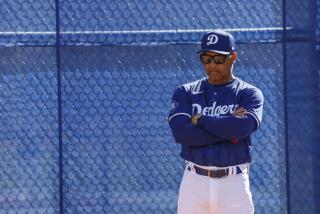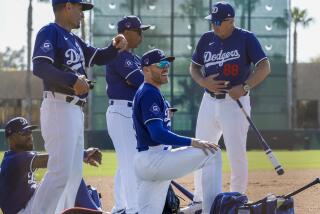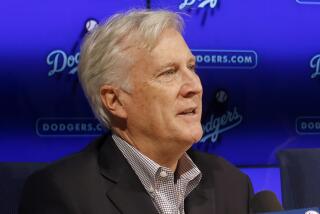For the Dodgers, Don Mattingly is leader of the pack
Make the rounds in the Dodgers’ clubhouse and this becomes clear: The players like Don Mattingly. They really, really like him.
Players smile when they talk about him. They laugh when they share stories about him. They sound proud that he’ll be leading them Thursday in the opening game of the National League division series against the Atlanta Braves, his first playoff game in three years as Dodgers manager.
But the Mattingly the players know isn’t the same person the public sees, a laid-back, self-effacing Midwesterner.
“Laid back?” utilityman Jerry Hairston Jr. said. “I wouldn’t say that.”
Every day, around the time the first pitch of a game is thrown, the players see Mattingly transform in the dugout. Donnie Baseball turns into Donnie Bulldog.
“I always felt the field was where you could be what you wanted to be,” Mattingly said. “You have to get yourself in the frame of mind that’s best for you. It’s game time, you know?”
Catcher A.J. Ellis chuckled and chose his words carefully.
“He’s extremely intense,” Ellis said. “He’s very interested in balls and strikes. He makes sure the umpire knows his interpretation of the strike zone might be different than the umpire’s that night.”
In other words, he’s frequently barking at the umpires.
This is the part of Mattingly to which players connect.
“Once the game starts, he’s still got that player mentality,” pitcher Clayton Kershaw said. “He’s pretty competitive. You definitely see why he was a successful baseball player.”
Mattingly’s calm demeanor in the clubhouse makes the players comfortable. His intensity in the dugout is what earns their respect. They feel as if he’s protecting them.
When the Dodgers brawled with the Arizona Diamondbacks on June 11 at Dodger Stadium, Mattingly was fighting alongside them — literally. At one point, he tossed Diamondbacks bench coach Alan Trammell to the ground.
“It definitely drives us to see he’s engaged and see he’s in the fight with us,” Ellis said.
That’s what the players say they mean when they call him a players’ manager.
“You definitely need a guy that’s there with you, not a guy who kind of wants to distance himself from the players and be an authority figure,” first baseman Adrian Gonzalez said.
Mattingly downplays the talent he had as a player. He feels his determination and smarts are what transformed him from a 19th-round pick into one of the most iconic of all New York Yankees. It’s what he tries to pass on to his players.
Mattingly said he manages the way he asks his players to play — with constant focus and attention to detail, regardless of the situation. That’s why Mattingly was screaming at the home plate umpire at Coors Field in Denver in early September.
The Dodgers were up, 10-8, against the Colorado Rockies. The lead appeared safe. Even if they lost, it wouldn’t have mattered much. The Dodgers’ lead over the second-place Diamondbacks in the NL West was at 12 games. But Mattingly had to say something when watching a couple of potential third-strike calls go against closer Kenley Jansen.
“Strike five!” Mattingly shouted sarcastically toward home plate.
The calls turned out to be of minimal consequence. The Dodgers won. However, Mattingly was still fuming after the game.
“You ask your guys not to let down, right?” Mattingly said. “Just because it’s a 5-2 game or something and he doesn’t think it’s a big deal, he misses that call, it could change the whole inning.
“You’re in Colorado. That leads to a cheap base hit, then a three-run homer, now you’re tied. So the game should have been over. I don’t want to let it get to the next pitch.”
Jansen said when Mattingly complains about a strike call, he feels he doesn’t have to do so himself.
“Once he gets their attention, I’m like, ‘I don’t have to worry about that now,’” Jansen said.
General Manager Ned Colletti has come face-to-face with that intensity when discussing personnel moves with his manager.
“All our conversations end in a good place. But our conversations, too, have had a little bit of emotion,” Colletti said.
While Mattingly might direct his anger at umpires or opposing coaches, his own players say he remains even-tempered with them. Even when the Dodgers were in last place and rumors were flying Mattingly would lose his job, players couldn’t recall him raising his voice in the clubhouse. He didn’t have to. By then, they knew with whom they were dealing. In this case, the consistency of his demeanor came to symbolize the strength of his character.
“We knew that he wasn’t happy with the way we were playing,” Kershaw said. “But he did it without being mad at us. His demeanor didn’t change, but we understood the point he was trying to get across. That’s pretty tough to do.”
Mattingly continues to emphasize a sense of urgency. The message might be more important now than it’s ever been. It’s something Mattingly came to understand over his playing career, which included a most-valuable-player award and six All-Star games but only one playoff appearance and no World Series rings.
“I thought I would make the playoffs all the time with the Yankees,” Mattingly said. “We had good teams when I was out there. You find out how hard it is to get there. You assume as a young player that you’re going to get there all the time but you find out that’s not the case. You also find out as you get older, your career goes so fast.
“I played 13 years, but it feels like it was forever ago. Their time here, I don’t want them to waste it.
“You may get a shot every year. That’s really what you should want as an organization, to be in the playoffs every year. But you don’t know that. So when you get a shot, you have to be ready. You don’t want to leave a stone unturned.”
Twitter: @dylanohernandez
More to Read
Are you a true-blue fan?
Get our Dodgers Dugout newsletter for insights, news and much more.
You may occasionally receive promotional content from the Los Angeles Times.






